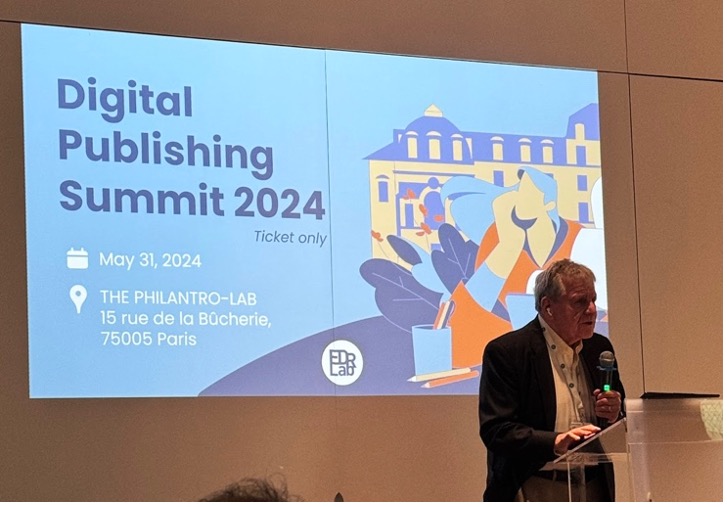A highlight was George Kerscher’s keynote at the start of the day. A blind reader in addition to being CTO of the DAISY Consortium, he went through his history of thinking about accessibility in publishing and his prodigious impact on the space. Did you know that he coined the phrase “print disability”? George has been involved in standards, testing, and advocacy in accessible book publishing for decades; it was fascinating to hear this history spelled out. (I hope his speech will be published openly soon!) [Update 1 July: Now online here!]
We heard a lot about the work of EDR Lab. This group, led by Laurent Le Meur, is busy with a number of important projects. The list is a bit staggering, in fact:
- Gautier Chomel is co-editor of the W3C’s UX Guidelines / Display Techniques for accessibility metadata.
- They are involved in the W3C work on text and data mining, supporting writing a specification associated with the EU CDSM and AI Act.
- Laurent is co-editor of the ISO spec for Light Content Protection (LCP), a form of digital rights management that is compliant with the European Accessibility Act (EAA). EDR Lab originated this technology and continues to develop it.
- We got an update on the ABE Lab work, a research project with Fondazione LIA and KB.nl focused on issues around remediating publisher backlists for EAA compliance.
- ThinkPub is a Creative Europe research project whose purpose is to educate EU publishers about innovation in the book industry, led by Beletrina.
- They continue to work on and involve the mobile and web toolkits for Readium, the open-source reading system tools.
- Attendees saw a demo of what is happening with Thorium, the desktop app for ebook reading. Daniel Weck, the chief engineer, told us about integration with LCP and the possibility of limited sharing from Thorium.
The French Publishers Association (SNE) Norms and Standards group and EDR Lab are collaborating on the QualEbook initiative. This group is working on the quality of ebooks, integrating corporate social responsibility into the realities of digital publishing. This project is centered around a set of maturity standards for digital publishing, normalizing and standardizing accessibility work. They have developed a valuable checklist for publishers engaged in this work.
Finally, there was a really cool demo from the folks at the Swedish Agency for Accessible Media (MTM Sweden) about reading mathematics with assistive technologies. They demonstrated a number of flat, incorrect readings of math and MathML, highlighting the trickiness of math with synthetic speech. They have found a solution with a tool called MathCAT which generates speech and braille from MathML.
We also heard from Neils ‘t Hooft about Immer and social reading, from the folks at Bulle Studio with a demo of a tool for manga/webtoon translation and lettering, from NetGalley, and from DRMInside, a web content protection technology.
When in France, you have the benefit of wine with lunch, and wine to end the day. What better way to decompress after all that stimulation and engagement? Congratulations to the hard-working organizers at EDR Lab on an excellent day.

